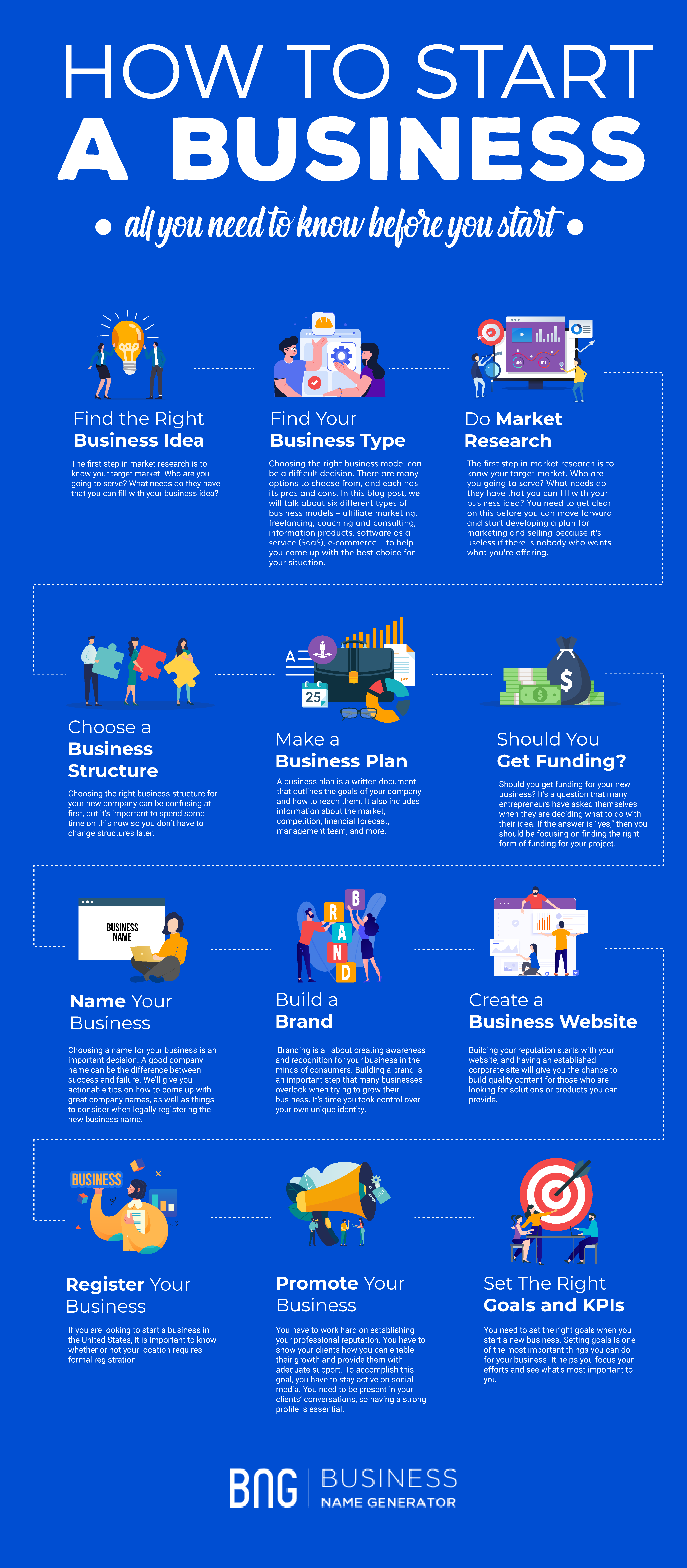Why do People Start Their Own Business?
Is it more personal freedom, a better work-life balance, a higher income, or all of the above? There are several benefits that come from being your own boss, and that’s exactly why people decide to start their own businesses. So, are you ready to start your business? Sit down, grab a warm cup of coffee and make notes as you dive deep into this article.
Dummies Guide to Start Your Own Business – 12 Steps
We know you’re not a business dummy — we’re only trying to make the whole process of starting your own business as easy as possible. After all, it’s no easy feat! So, let’s make sure you’re in the top percent of successful business owners this time next year with the right guidance. Without further ado, here are the 12 steps to start your business:
- Find the Right Business Idea
- Find Your Business Type
- Do Market Research
- Choose a Business Structure
- Make a Business Plan
- Decide if You Need Funding
- Name Your Business
- Build a Brand
- Create a Business Website
- Register Your Business
- Promote Your Business
- Set the Right Goals and KPIs
1. Find the Right Business Idea
Starting an online business can be a daunting task. What do you sell? Who are your customers? Where do I find them? These are all important questions to ask yourself when trying to start an online business. One of the first questions you need to answer is how to find the right idea for your business. Let’s look at some actionable tips to help you find the right business idea.
Here’s what you need to know about problem-solving and business. The bigger the problem you can solve, the more money people are willing to pay. But how do you find problems that are worth solving?
Tips for Finding Problems to Solve:
- Get outside and meet people. Pay attention to the difficulties that come up over and over again in everyday life. This is a great way to find new business ideas or refine an existing business idea you have already started with a problem you want to solve
- Join different Facebook groups in your niche. Listen to the conversations and take note when someone mentions an issue they are facing.
- Use Google Ads and keyword research tools. Are there any popular terms that keep appearing over and over again?
- Research your competition. Find out what your competition has done so far, and if there’s anything you can learn from in their journey. Don’t make the same mistakes as someone else — work smart not hard.
As you see, there are different ways to find the right idea for your business. The important thing is you listen to what people have to say. They’ll be as happy as you if you manage to find a solution for their problems.
There’s no need to create something completely new, you can also find a new angle to an existing solution. Finally, make sure that this problem has economic potential, and people will be willing to pay for a solution. It’s all about finding problems where money is involved. If people aren’t willing to pay for the solution, then the solution isn’t worth developing.
2. Find Your Business Type
Choosing the right business model can be a difficult decision. There are many options to decide from, and each has its pros and cons. In this blog post, we will talk about six different types of business models – affiliate marketing, freelancing, coaching and consulting, information products, software as a service (SaaS), e-commerce – to help you come up with the best choice for your situation.
First, you need to know what your strengths and weaknesses are. Do you like working with people? How involved do you want to be in your day-to-day business operations? Are you looking for passive income ideas?
All these questions determine the type of business that best suits your character. Let’s dive into popular business types.
- Affiliate marketing: This is a business model where you promote other people’s products for a provision. This business model is especially suitable for people with blogs and existing audiences. Managing affiliate marketing campaigns requires solid people skills. You can also choose to be an affiliate for different companies at the same time, which means you’ll need to set up several accounts on various platforms and keep track of all your links.
- Freelancing business: This is a business model where you provide services to clients or other businesses. This business model is suitable for people with specialties whether it’s programming, marketing, or freelance writing. The drawback is that you have to manage all your clients on your own.
- Coaching and consulting business: This is a type of business where you offer your expertise to other people on certain issues for either hourly rates or monthly retainers, depending on the agreement between you and the client. People who are experts in their field can pick this kind of business model.
- Selling information products: This is a business type where you package your skills and sell them as a course, e-book, or webinar. This type of business is typically easier to start because you only need a computer with an Internet connection. It is a great option for people with existing audiences.
- Selling software as a service: This is when your clients don’t own the product, but they get permission to use it. This means that you are providing them some sort of “software” (e.g., CRM). The drawback of this business type is that you first have to develop the software.
- Ecommerce business: This is when you sell products and services to your customers. You can either create the product yourself or resell someone else’s product. This type of business requires a lot of inventory management, shipping, etc., so I would recommend outsourcing those tasks as soon as possible. This business requires a solid understanding of various skills and can seem daunting for complete beginners.
As you see, there’s no right or wrong answer here. It’s all about your personal preferences and strengths. Which business type would work best for you? Which type is most suited for your main business idea?
3. Do Market Research
The first step in market research is to know your target market. Who are you going to serve? What needs do they have that you can fill with your business idea? Once you’ve determined the answer to these questions, then comes the next important step: understanding your industry. Who are the competitors out there that offer similar products or services like yours? How does your business compare to theirs? What makes them different from yours and vice versa?
How do you gather knowledge about your market and your customers? There are simple things you can do.
You can interview potential clients. Ask them about their needs and wants. Are they having a hard time with a problem they can’t solve? What kind of features are they missing from existing brands in the market?
You can also use one of the online tools that help you find out more about your target audience. Google Analytics will give you an idea about the demographics of your website visitors. And Google Trends can show how popular certain keywords are at a given time.
Finally, once we understand our target market and how we stack up against other players in our industry, it’s time to do the most important thing: position your business.
What makes your product or service better in regard to existing businesses in the market?
How are you different? How is your business better? These are questions you need to answer to gain the attention of potential customers.
Market research is the process of learning why consumers will want to purchase your service or product. If you can present the value you’re providing to your customers, you’ll instantly gain an upper edge compared to your competitors.
4. Choose a Business Structure
Choosing the right business structure for your new company can be confusing at first, but it’s important to spend some time on this now so you don’t have to change structures later.
Let’s discuss how to pick between Sole Proprietorship, Partnership, LLCs, Corporations, and Nonprofits as well as what the differences are among these forms of business structures. We’ll talk about why each form is appropriate for different types of businesses, and which one might work best for your specific needs.
Sole Proprietorship
A sole proprietorship is a company arrangement in which the owner is the only person with responsibility for any liabilities or debts that arise from the firm. This implies that all the company’s profits go to the owner, however, 100% of any financial losses incurred as a result of debt or litigation fall on him as well.
This business structure is perfect for people that wish to avoid administrative tasks and higher fees when registering your company. This allows you to focus on growing your business rather than extensive paperwork and legal compliance. There are pros and cons to being self-employed.
Partnership
A partnership is a non-incorporated business form with multiple owners, similar to a sole proprietorship. Partnerships, like sole proprietorships, don’t have the liability protection of a formal company.
A partnership structure is best for you if you don’t want to start your first business alone. This is also a viable option if you have an experienced partner that can benefit your company with the knowledge and skills they deliver. Remember that all partners have to contribute funds in a partnership structure.
LLCs
A limited liability company (LLC) is a hybrid entity that combines the personal asset protection of a corporation with the flexibility of a partnership or sole proprietorship. The LLC form is preferred by most small businesses since it is easy to run and offers favorable tax treatment.
Limited liability is one of the primary benefits of the limited company structure. You, as an owner, are not personally responsible for the losses and debt of the business. This is a huge advantage: this structure allows you to conduct business without jeopardizing your house, family, or lifestyle.
Corporations
A corporation is a distinct legal entity that is run by its shareholders. Corporations have more formal rules than LLCs, and investors are more inclined to invest in them. The majority of large businesses, such as Apple, Google, and Amazon, are incorporated.
There are several advantages to becoming a corporation, including restricted personal liability, simple transfer of ownership, continuity of operation, easier access to capital, and occasional tax benefits. The benefits you receive from the corporation depend on the specific legal setup of the structure.
Nonprofits
A nonprofit organization is one that is not funded by investors, but instead relies on donations. Nonprofits are usually set up to advance a social cause and are therefore exempt from paying taxes. The Red Cross, for example, is an example of such an organization.
Choosing how to organize your business will have a significant impact on you and your business. It will determine how much tax you pay, the degree of risk or liability to your personal assets, and the ability to access various funding sources. Picking your business structure is one of the first important decisions you have to make when starting your business.
5. Make a Business Plan
If you want to know how to start a business, you first have to have a business plan. A business plan is a written document that outlines the goals of your company and how to reach them. It also includes information about the market, competition, financial forecast, management team, and more. The goal of a business plan is to help you make informed decisions as an entrepreneur. Every entrepreneur should have one because it helps with decision-making in all aspects of running your company, from marketing to operations.
A business plan is helpful if you are looking for partners or employees who want to buy into your vision because it shows them the bigger picture of where you’re going with your idea. It allows others to see what they can contribute towards making this vision become a reality.
MORE: How to Write a Business Plan – The Ultimate Guide
6. Decide if You Need Funding
Should you get funding for your new business? It’s a question that many entrepreneurs have asked themselves when they are deciding what to do with their idea. If the answer is “yes,” then you should be focusing on finding the right form of funding for your project.
You’ll need a detailed understanding of the costs involved in starting your company. Apart from regular operational expenditures, you’ll have to think about things and procedures you’ll have to invest in once your company is up and running. Some costs to cover include buying or renting an office, office equipment, and furniture, the cost of getting a business license, insurance, staffing expenditure, website development, marketing, and bookkeeping.
The largest amount will be needed for paying employees. Usually, small companies have at least two to three employees. In the US, paying two employees for a period of three months will necessitate approximately 10,000 dollars.
Now that you have an idea about the cost of setting up a business, you will have to identify the right funding source.
Investing your savings in the business is one option. You can also get family members or business partners involved. Alternatively, seek angel investors and shareholders. In order to appeal to such experienced investors, you’ll need a strong and unique company concept.
The right form of funding depends on how much money you need to get your business running. The easiest way to start is by covering the costs yourself. If you can’t do that, you should look for investors, loans, or partners. This is especially important in the initial stage, when you have to spend a lot on marketing and advertising.
Remember that not all forms of funding are equally suitable for every business idea. In order to get the best deal possible, you should research all your options thoroughly.
7. Name Your Business
Choosing a name for your business is an important decision. A good company name can be the difference between success and failure.
So, how do you pick a name type that best suits your business? Well, it depends on what you’re selling and who your target market is.
For example: If you want to sell clothing that’s targeted towards women, then using a descriptive or arbitrary name such as “Samantha” might not be the best option because there are many other brands with the same name. On the contrary, if you were to pick an evocative name like “Genie’s Closet”, you might evoke the right emotions and attract the attention of your targeted clients.
After you’ve come up with a list of appropriate name ideas, make sure to do some research and find out if it is already in use by another company or person (i.e., check online trademark databases). If your desired brand is available for registration, go ahead and file it with the corresponding authorities.
You can also simplify the process of coming up with your business name if you use the business name generator we have on our website. In just a few simple steps, you’ll have the perfect name, ready to register and use right away!
8. Build a Brand
Building a brand is an important step that many businesses overlook when trying to grow their business. It’s time you took control over your own unique identity.
Here’s the truth – a recognizable and loved brand is one of the most valuable assets a company owns. A Nielson poll found that 59 percent of customers choose to purchase new goods from companies with which they are familiar.
As a small business, you will be competing against big brands with devoted customers and unlimited marketing budgets. That is why you must figure out how to stand out. This is exactly what a well-built brand can do for you.
Brand strategy is the first thing you need to create when building a brand from scratch. Your brand strategy shows how you’re different and better than your customers. It defines your purpose, promises, and shows how you solve problems for people.
You can think of brand strategy as the blueprint for how you want the world to see your business. The second part of branding is your brand identity. This is how you want to present your company to the public with visuals, messaging, and experience. It determines how you present your brand in a way that creates the biggest impact.
Your brand identity is what people see. That’s why it’s very important that you present your brand consistently across different channels. The last part of branding is brand marketing. This is defined as the way that your company brings awareness to your products or services. You have to ensure you use the right voice and effective communication to share the values of your company with the world.
You can do brand marketing through different channels like content marketing, paid advertising, SEO, social media marketing, and many more. We’ll dive deeper into them in one of the next chapters.
9. Create a Business Website
Your business needs a well-established online presence. Building your reputation starts with your website, and having an established corporate site will give you the chance to build quality content for those who are looking for solutions or products you can provide.
You can provide information about your company on the website like releasing information about new products or services coming out soon; highlighting old favorites from previous years that still hold up today (or even redesigning some classics); telling informative stories through pictures & videos that engage your target audience, or provide answers to common problems.
A business website can be the first point of contact for potential clients, whether they are in your area or not. You can use your website as an online scheduler where customers can book appointments with you from anywhere in the world. You can also use your business website to provide information that will help you establish your expertise in the respective field. Not only that, but you can even use your websites to access payments and provide support for digital clients. A website will give you a chance to accept payments and provide support via a digital channel.
A modern website gives you a lot of options and helps you run a business. A lot of new business owners worry that developing a website might cost them a fortune. But luckily, that’s not the case.
Setting up a website isn’t as hard as it used to be, in fact, many hosting providers have tailored their service around small businesses that may not be tech-savvy. We suggest going with BlueHost to host your website as they have an easy one-click WordPress installation tool.
10. Register Your Business
Business registration is not required in every state. If you are looking to start a business in the United States, it is important to know whether your location requires formal registration. You have to do your own research to determine if you have to register your business. Some cities have income limits that determine when you have to register your business.
Regardless, we suggest you register your business on day one to prevent liability as long as you can afford the registration fees. The sooner you register your business, the better. Once you find the perfect business name on Business Name Generator you can register your business on our website.
Do I need to register my online business with a federal agency?
To become a legal entity, most businesses do not need to register with the federal government., other than simply filing to get a federal tax ID. Small businesses sometimes register with the federal government for trademark protection or tax-exempt status.
If you want to protect your business, brand, or product with a trademark, you have to file with the United States Patent and Trademark Office once you’ve formed your business.
When do I need to register my business in another state?
If you operate a limited liability company (LLC), corporation, partnership, or nonprofit corporation, you’ll most likely have to register with any state where you conduct business activities.
These are the most common situation where you’re considered to be conduction business activities in a state:
- Your business has a physical presence in the state.
- You often have in-person meetings with clients in the state.
- A significant portion of your company’s revenue comes from the state.
- Any of your employees work in the state.
- Some states allow you to register online, whereas others require you to submit paper records by mail or in person.
In most states, you must register with the Secretary of State’s office, a Business Bureau, or a Business Agency.
You can always hire professionals to do the administrative work for you. But it’s usually better if you’re the one monitoring the process.
11. Promote Your Business
It’s time to promote your new business! But how? Some people think that they can just set up a Facebook page and post on it every day. Others believe that paid advertising is the only way to attract clients, but you need more than one acquisition channel if you want to succeed. The most common things new businesses focus on when starting promotion are content marketing, social media marketing, and paid advertising. It’s important not to neglect any one channel for too long because they are all equally important in attracting potential clients and leads!
You have to work hard on establishing your professional reputation. You have to show your clients how you can enable their growth and provide them with adequate support. To accomplish this goal, you have to stay active on social media. You need to be present in your clients’ conversations, so having a strong profile is essential.
You also have to provide people with valuable content that can help them solve their problems and challenges. Content marketing will attract new leads while the ones who are already interested in what you offer get more familiar with how you do business and the value you can provide.
Apart from content-based marketing strategies, you can do marketing in a number of additional ways. The kind of business you have determines the strategies you’ll use. For example, starting a lawn care business means you’ll likely do different promotional activities than if you’re starting a food business. Here are some of the most popular promotion ways:
- Pay per click (PPC) advertising on relevant websites where your targeted audience hangs,
- Strategic partnerships with other service providers for the purpose of increasing your market share,
- Email marketing campaigns that engage your existing customers,
- Hosting local events, organizing workshops and seminars to establish your expert reputation,
- Referral programs that encourage your existing clients to bring in new leads,
- Online webinars that serve the same purpose as local events and workshops, but are cheaper to plan and execute,
- Podcasts where you share your knowledge and show your expertise,
- Create an e-book and distribute it among clients and prospects,
- Partner up with local media to conduct an interview with leading experts in your company.
There are different ways to promote your business. The most important thing is to stay consistent and keep your audience engaged.
12. Set The Right Goals and KPIs
You need to set the right goals when you start a new business. Setting goals is one of the most critical things you can do for your business. It helps you focus your efforts and see what’s most important to you. Goals are often set in terms of money, but that doesn’t mean they always need to be related to making more money. You could also set a goal for customer satisfaction or employee engagement, depending on what’s most indispensable to your company. Once you set goals for your business, you will have to keep track of progress. To do so, you will need to choose the right KPIs.
Every business is different, and different businesses keep track of different KPIs. But there are general KPIs that most businesses monitor. These KPIs are:
- Leads generated: This is a simple, universal metric that demonstrates the effectiveness of your outreach and marketing efforts.
- The average fee per hour: This one is specific to service-based businesses. How much does your firm charge for each hour of service delivered? It’s possible that, after some time, you should raise your hourly fee.
- Repeat business rate: It’s wonderful to win new clients, but you shouldn’t forget about your current ones. A high repeat business rate will be indicative of quality, consistency, and overall customer satisfaction.
- Annual revenue per billable employee: This is the firm’s overall income divided by the number of employees. This statistic is crucial since it provides you with an estimate of your workers’ productivity.
- Profit margin: The difference between a company’s revenue and its expenses. Although this metric is sometimes used interchangeably with profitability, it has a separate meaning in the context of project management: it refers to how much money a firm makes after all direct costs have been deducted. In other words, the profit margin is the percentage of income that remains after all direct costs have been
As you see, the KPIs you should monitor depend on the type of business you’re running. It’s important to monitor the metrics that contribute to reaching your goals.
And remember that KPIs aren’t set in stone. You can change them as your business grows.
Other Things to Consider
Legal Requirements
Starting a business or any other corporate entity can be complicated. There are many legal requirements that you must meet before beginning to operate. Requirements vary depending on your location and nationality. In general, you will need to:
- obtain a federal ID number,
- a general business license,
- register with the proper authorities,
- and get an employer identification number (EIN) from the US Internal Revenue Service (IRS).
Furthermore, you’ll need to get liability coverage. You’ll also have to familiarize yourself with the tax rules that apply to your chosen legal form of business organization. All of this can get a bit complicated. Talk to a legal professional. It’s also possible to hire a lawyer to complete the licensing and registration process for you. Professional assistance can save you time and money, allowing you to start working on your business faster.
Accounting & Bookkeeping
Accounting for a new company is not an easy task. If you don’t intend to hire a full-time accountant, you should definitely outsource the process. Most accounting firms know how to handle the bookkeeping of modern companies. The same applies to freelance accountants. A freelance accountant will provide dependable and cost-effective services that are a great fit for a new firm looking to start up on a tight budget.
A final thing you’ll need to choose is the accounting software you’ll be using in your company. Client billing and invoicing, as well as online payments, are something you’ll have to deal with on a regular basis. You will need a flexible and user-friendly solution like Xero, for example. Other popular accounting software options include FreshBooks, Quickbooks Online, and Wave Accounting.
Hiring Employees
You might be able to run your firm on your own at first and outsource elements of your business that you just can’t manage (marketing, website creation, PR).
But as your business grows, you will have to increase the number of people working in the company. While investing in salaries could be costly, it will increase your company’s revenue generation potential and improve the quality of your business.
When hiring new employees, look for experts with enough experience that specialize in their respective fields. Always seek references in order to confirm the experience and the reputation of the person you’re considering for addition to the team.
Remember that hiring is an ongoing process, so when adding new staff members, make sure they are compatible with other employees already working in your company. You want employees that can work in a team and produce quality results.
How to Start a Business with No Money
Starting a business with no money may seem like a daunting task, but it is entirely achievable. Here are the steps you could take if you want to start a business, but still need funding:
- Begin with a business idea that is based on your skills, expertise, and passion. This way, you can offer services or create products without needing much external help.
- Draft a solid business plan that will serve as a blueprint for your business. The plan will help you identify potential challenges and how to overcome them.
- In the early stages, you can trade your products or services with others to get what you need for your business.
- Use social media, content marketing, and SEO to promote your business. These methods are often low-cost or free and can reach a large audience.
- Look for startup grants, small business contests, and crowdfunding opportunities.
- Offering your services as a freelancer or consultant can provide a revenue stream while you build your business.
- Bootstrap! Bootstrapping involves funding your business out of your pocket. This means keeping your day job and working on your business during your free time.
You will need a lot of time and determination, but with the right mindset, skills and a little bit of luck you’ll have a business up and running for sure!
Pros and Cons of Starting a Business
Are you still struggling to make up your mind if you want to start a business? Let’s check out all the pros and cons in the table below:
| Pros of Starting a Business | Cons of Starting a Business |
|---|---|
| Financial Independence With a successful business, you have the potential for unlimited earnings. You can be your own boss and decide how many clients you want to take on and how much money you want to earn. The financial possibilities are much less limited than when working for someone else. | Financial Risk Starting a business requires capital and there’s a risk you may not recover your initial investment. You might end up losing a lot of money, and you have to constantly think about taxes. |
| Flexibility You can set your own work schedule and have better work-life balance. You don’t have to ask anyone for days off, and the only deadlines you need to meet are the ones you decide on with your clients. | Time Commitment A business can demand much more of your time than a traditional job, especially in the early stages. You might find yourself working 16h days, and you might always have to be available for clients, whereas in a traditional job you can just close the computer and forget about work for the day. |
| Personal Satisfaction Building something from the ground up can be fulfilling. You will watch your business bloom and be able to say you created something from scratch with your own hands. | Stress and Pressure Running a business can be stressful and demanding, with many responsibilities. If you have a hard time working under pressure, opening your own business might not be the best decision. |
| Control You have the authority to make decisions that shape your business’s direction. | Decision Making Every decision, good or bad, falls on you which can be daunting. If you make a bad move, there is no one you can put the blame on. |
| Job Creation Starting a business can create jobs, contributing positively to the economy. You’ll be able to give back to the community and give other people jobs. | Unstable Income Unlike a job, business income can fluctuate widely. Some months may give you better pay, others worse. You might end up getting less, or the same amount of money in exchange for more stress. |
| Pursuing a Passion A business allows you to make a living doing what you love. | Risk of Failure A significant percentage of new businesses fail within the first few years. |
MORE: 10 Different Types of Startup Business Ideas That Might Inspire You
Key Takeaways
We learned everything we needed to know to start a successful business. As you see, starting a business requires a lot of knowledge. Everyone can file the papers and get their company registered, but that’s all worthless if you don’t start your business on the right foundations. It’s important that you take the leap when the time comes. But we generally suggest you spend enough time planning your business to have the best chance of success.
We wish you all the best on your entrepreneurial journey.













Leave a Reply